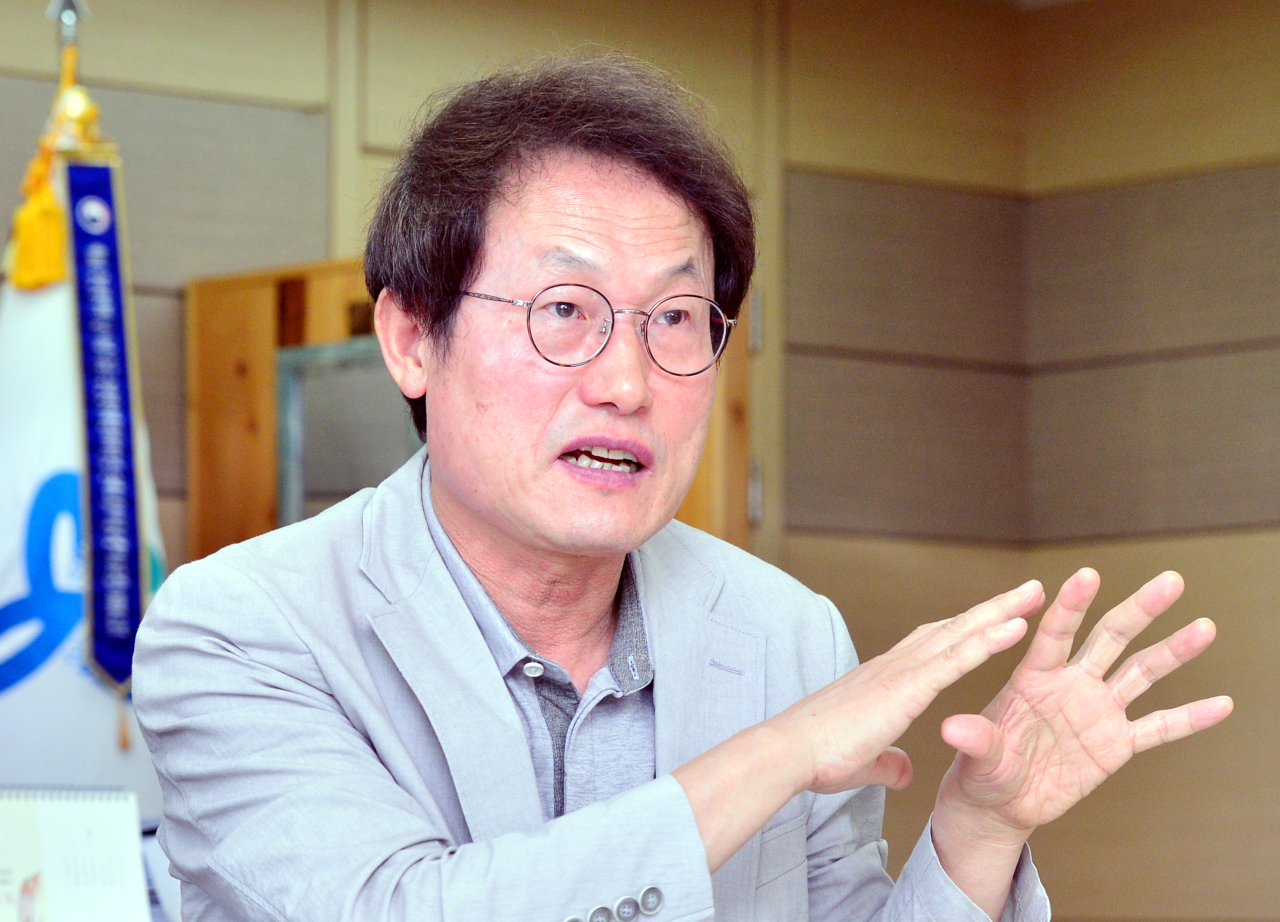[Herald Interview] 'COVID-19 speeds up revolution in education'
Cho says Korea proves that it is possible to achieve safety and education in COVID-19 era
By Ock Hyun-juPublished : June 9, 2020 - 18:49

The COVID-19 pandemic has brought forward much-needed revolution in education.
Ready or not, the schools have moved online, opening a new space for both education equality and inequality, said Seoul’s education chief Cho Hee-yeon.
“In online learning, there is more room for educational inequality to worsen, but at the same time, there exist opportunities to enhance personalized learning,” Cho, superintendence of Seoul Metropolitan Office of Education, said in an interview with The Korea Herald at his office in central Seoul.
Despite the many drawbacks of online learning, some positive changes are also noticeable. Some students who have been shy in physical classrooms become more active. Teachers can give each student different feedback customized for their needs, Cho explained.
“In the process of preparing for online classes, cooperative school culture has been formed through active exchanges among teachers seeking to raise their quality of lectures,” he said, calling it a “revolution” in classrooms.
The online learning cannot entirely replace traditional education held in classrooms because the meaning of education goes beyond accumulating knowledge. It is rather the process of forming their personalities and growing as a member of society by interacting with peers and teachers and learning to respect each other.
“So the future of education is blended learning,” Cho said, adding the optimal ratio for online learning and in-person classes could be divided half and half. “Remote learning, which was triggered by the COVID-19, will accelerate a transition from in-person classes-focused education to blended learning-focused education.”
While many other countries interchangeably choose between the opening and closing of schools, Korea is promoting continuity of education for students through blended learning, an approach that combines distance learning methods with in-person education methods.
Faced with the novel coronavirus epidemic, Korean schools began offering online classes in April in the country’s biggest online learning experiment. Starting from May 20, the phased reopening of schools ended Monday, with virtually all Korean students now back in classrooms.
Currently, classes are held both online and offline for most schools to reduce the number of students in physical classrooms. Depending on grade and class, it is recommended that about one-third of total students of a school receive in-person classes while the rest learn from home.
While in school, students also take breaks and dine at different times. They get temperature checks twice a day and wear a mask at all times except during meals.
“COVID-19 provides us a chance to develop into a leading country in distance learning, keeping pace with our reputation as a leading IT country,” he said, vowing more investment in building infrastructure at schools for remote learning.
The Seoul education office has already offered digital devices to students from low-income families to bridge the digital divide, seen as one of the steps to increase Korea’s preparedness for digital learning.
“Even though the virus situation gets worse, we don’t consider all-out school closures. Students’ learning will continue online,” he said, referring to various quarantine measures put in place at Korean schools. He labeled it “K-education,” the signature Korean quarantine model in the education sector.
Reopening of schools is a major test for the country’s efforts to return to normalcy in the people’s daily lives while keeping the virus situation under control, as the pandemic is expected to prolong.
Safety concerns persist over school reopening, as Korea continues to see sporadic, small-scale coronavirus outbreaks in the Seoul metropolitan area. As of Monday, some 517 schools, nearly all in the Seoul metropolitan area, had suspended their school operations.
However, there has not been a reported incident of a coronavirus transmission at a school, according to the Education Ministry.
“Our strategy is to find a way to harmonize and achieve both -- quarantine measures and education -- in the COVID-19 crisis,” he said.
And the revolution in the country’s education system should go beyond establishing a stable online learning system, he said.
The COVID-19 pandemic showed the world that only cooperation beyond borders can tackle global issues such as climate change and infectious diseases, which is why educating Korean students to become “global citizens” is necessary, he said.
For that, Cho plans to further pave the way to raise awareness of human rights, peace, cultural diversity and environment in classrooms across the country’s capital.
A former liberal sociology professor at Seoul’ SungKongHoe University, Cho, who was elected to his post in 2014 and was reelected for his second term in 2018, has been at the forefront of tackling the education gap stemming from parental wealth that often affects students’ academic performance and their chances to go on to university.
His liberal yet controversial policies have put a focus on offering equal opportunities for education -- rooting out hierarchy in Korea’s school system by abolishing elite schools and boosting the quality of public education by customizing it to each student’s needs.
By Ock Hyun-ju (laeticia.ock@heraldcorp.com)
-
Articles by Ock Hyun-ju




















![[Today’s K-pop] BTS pop-up event to come to Seoul](http://res.heraldm.com/phpwas/restmb_idxmake.php?idx=642&simg=/content/image/2024/04/17/20240417050734_0.jpg&u=)